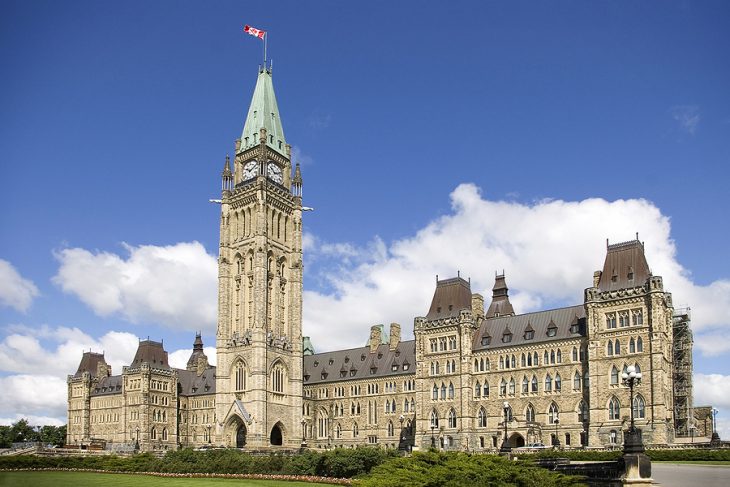
By Denis Carmel
OTTAWA – “This fall, in addition to extending the wage subsidy, the Government will take further steps to bridge vulnerable businesses to the other side of the pandemic by introducing further support for industries that have been the hardest hit, including travel and tourism, hospitality, and cultural industries like the performing arts,” reads Wednesday’s Speech from the Throne, kicking off the next session of Parliament.
“The Government will also identify additional ways to tax extreme wealth inequality… by addressing corporate tax avoidance by digital giants. Web giants are taking Canadians’ money while imposing their own priorities. Things must change and will change. The Government will act to ensure their revenue is shared more fairly with our creators and media, and will also require them to contribute to the creation, production, and distribution of our stories, on screen, in lyrics, in music, and in writing,” said Governor-General Julie Payette, reading the speech in the Senate chamber.
Canada’s broadcasters and creatives are on board with those sentiments.
“The Canadian Association of Broadcasters (CAB) agrees with what the Government of Canada stated in today’s Speech from the Throne on media reform. While the CAB looks forward to new broadcasting legislation outlining how the Government intends to create fair and sustainable media ecosystem, Canada’s private broadcasters cannot wait. Legislation and regulatory implementation will take time – something private local television and radio stations do not have,” said Lenore Gibson, chair of the Canadian Association of Broadcasters and senior counsel with Bell Media, in a statement.
“Without immediate action this fall, Canada will see many local television and radio closures across the country. This will deny communities access to local news and a daily media voice, reducing the diversity of Canadian news on-air across our provinces and territories. This is especially concerning as local news has never been more important to keeping communities safe and informed,” Gibson added.
“Canada’s private broadcasters look forward to working with the Government of Canada and CRTC on regulatory relief and additional short-term measures to avoid station closures and protect local news in Canada.”
“Canada’s private broadcasters look forward to working with the Government of Canada and CRTC on regulatory relief and additional short-term measures to avoid station closures and protect local news in Canada.” – Lenore Gibson, CAB
“While we support making sure companies like Facebook pay their fair share and are held liable if they are deemed to have published or promoted illegal content on their platforms, we are looking forward to specific policy proposals from this government,” said Daniel Bernhard, executive director and spokesperson for Friends of Canadian Broadcasting. “The situation is far too dire to delay action any further: we expect the government to show us it means business, and soon.
“We will be happy to help the government succeed in bringing these polices into action, while reminding them of the importance of these issues for our supporters in key ridings across the country ahead of the next election.”
“If today’s speech is any guide, our government is more concerned with regulating people’s speech and creativity on the Internet, than with ensuring everyone has access to it,” countered Matt Hatfield, campaigns director for OpenMedia, in an email. “Many of us are legitimately concerned by the size and influence of big tech companies, and we all want to see Canadian creators and news outlets flourish and succeed. But in talking up the need to go after Big Tech, the government is signalling support for the poorly thought through link and streaming tax proposals that Canadian Heritage Minister Guilbeault has been championing in recent months.
As for the film and TV producers, “we’re pleased the federal government has reaffirmed its commitment to require foreign online companies contribute to the creation of Canadian content, and see this as an encouraging indication that revisions to the Broadcasting Act will be introduced in the upcoming legislative session,” said the Canadian Media Producers Association in an email.
“We look forward to working with all parties to ensure contributions from streaming services create opportunities for Canadian producers to control and monetize their homegrown IP. We also applaud the government’s commitment to extend much-needed Covid-19 support programs and to support the elevation of underrepresented voices within Canada’s cultural industries.”
“The Covid-19 crisis is hitting artists and cultural industries hard; this reform is, more than ever urgent,” said the Coalition for the Diversity of Cultural Expressions, in a press release.
“A recent study by Canadian Heritage showed it could cost a billion dollars to the Canadian Cultural sector from now until 2023 if Legislation does not change. By integrating them in the Canadian Broadcasting System, hundreds of millions of dollars a year will feed our ecosystem. While our public finances are under pressure, a reform of the Broadcasting Act generates a structuring solution for the cultural sector and to ensure a diversity of cultural expressions,” the Coalition said in French.


